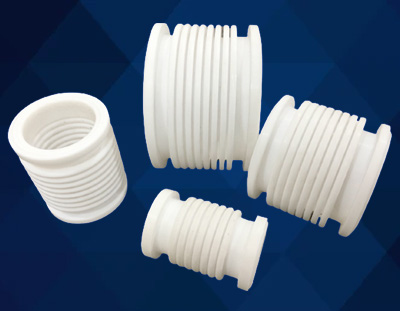
In the vast realm of technology, numerous components are crucial in ensuring seamless functionality and efficiency. The PTFE expansion bellows is one such component that often goes unnoticed but is integral to various applications. These versatile devices serve many purposes, primarily to separate fluids from nearby branches. From pulse dampers to HVAC systems, pharmaceutical processing to pollution control, piping systems, and much more – PTFE expansion bellows have become an indispensable part of modern technological advancements.
Understanding PTFE Expansion Bellows
Polytetrafluoroethylene (PTFE), commonly known as Teflon, has become the go-to material for expansion bellows applications. This remarkable material possesses unique properties that make it highly suitable for various technological needs.
The Functionality of PTFE Expansion Bellows
At its core, an expansion bellow is a flexible connector between two pipes or vessels, accommodating movement caused by thermal expansion or contraction. The primary function of a typical PTFE expansion bellow is effectively isolating fluid flow from adjacent components. These bellows ensure smooth operations and prevent potential damage by providing flexibility and absorbing movements caused by temperature variations or vibrations in machinery.
Versatility across Industries
The adaptability and versatility offered by PTFE expansion bellows have made them indispensable across various industries. Let’s delve into some key sectors where their usage has revolutionized technological processes:
- Pulse Dampeners: In industries where pulsating flows occur regularly, such as chemical processing plants or oil refineries, pulse dampeners are crucial in reducing pressure fluctuations within pipelines. The high chemical resistance PTFE offers makes it an ideal choice for constructing these dampeners.
- HVAC Systems: Heating Ventilation Air Conditioning (HVAC) systems rely on PTFE expansion bellow’s to accommodate thermal expansions and contractions without causing structural damage. These bellows ensure the seamless flow of air and prevent leaks or blockages.
- Pharmaceutical Processing: The pharmaceutical industry demands strict adherence to hygienic standards, making PTFE bellows an ideal choice for processing applications. These bellows maintain the desired level of cleanliness while accommodating movements caused by temperature changes during various stages of pharmaceutical production.
- Pollution Control: Environmental regulations necessitate efficient pollution control systems in industries emitting harmful gases or substances. PTFE expansion bellows play a vital role in these systems by isolating gases, preventing leaks, and absorbing vibrations that can compromise efficiency.
- Piping Systems: In intricate piping networks with multiple connections, using PTFE expansion bellows becomes crucial to absorb movements resulting from thermal fluctuations or vibrations caused by machinery operations. This ensures longevity and reliability while minimizing maintenance requirements.
Advantages of Using PTFE Expansion Bellows
The utilization of PTFE bellows offers numerous advantages over traditional alternatives:
- 1. Chemical Resistance: The chemical inertness possessed by PTFE makes it highly resistant to various corrosive substances found in industrial environments, ensuring longevity and durability even when exposed to harsh conditions.
- Temperature Resistance: With an exceptional operating temperature range (-200°C to +260°C), PTFE can withstand extreme heat or cold without compromising its structural integrity or functionality.
- Flexibility and Absorption Capabilities: The unique composition and design allow these bellows to accommodate axial (lengthwise) and lateral (sideways) movements caused by thermal expansions/contractions or external vibrations, thereby preventing stress build-up within the system.
- Low Friction Coefficient: Due to its low friction coefficient, Teflon minimizes pipeline resistance, reducing energy consumption while promoting efficient fluid flow.
- Hygienic Properties: PTFE is inherently non-toxic, non-reactive, and resistant to microbial growth, making it an ideal choice for applications in the pharmaceutical and food processing industries where hygiene is paramount.
In conclusion, the versatility and functionality offered by the PTFE expansion bellows have revolutionized various sectors within the technology realm. From pulse dampeners to HVAC systems, pharmaceutical processing to pollution control systems, and complex piping networks – these bellows have become indispensable component ensuring seamless operations while preventing potential damage or leaks. With their exceptional chemical resistance, temperature tolerance, flexibility, low friction coefficient, and hygienic properties – PTFE expansion bellows continue to pave the way for technological advancements across multiple industries. As technology progresses further into uncharted territories, it is sure that these remarkable devices will continue to play a vital role in shaping our future.

